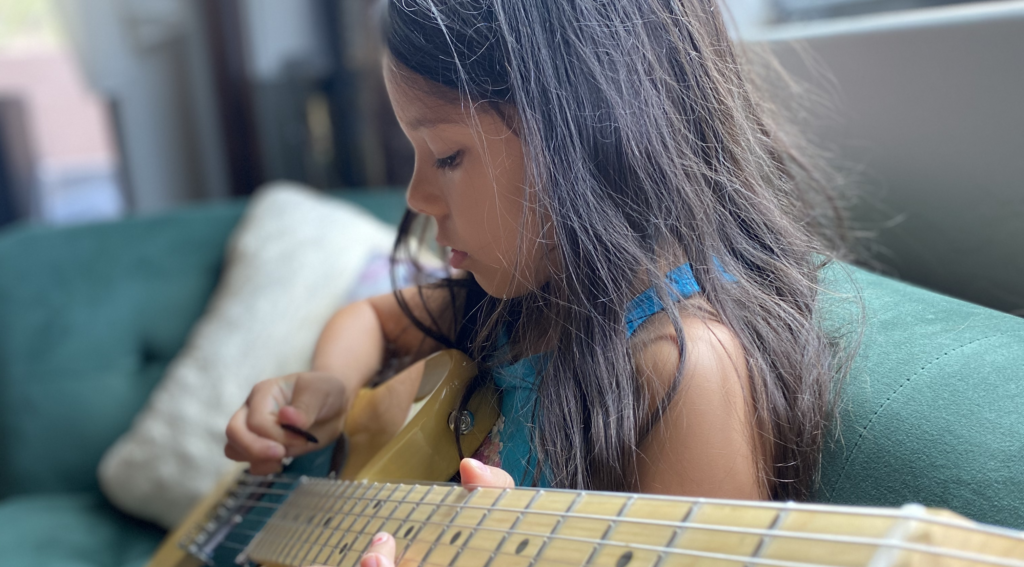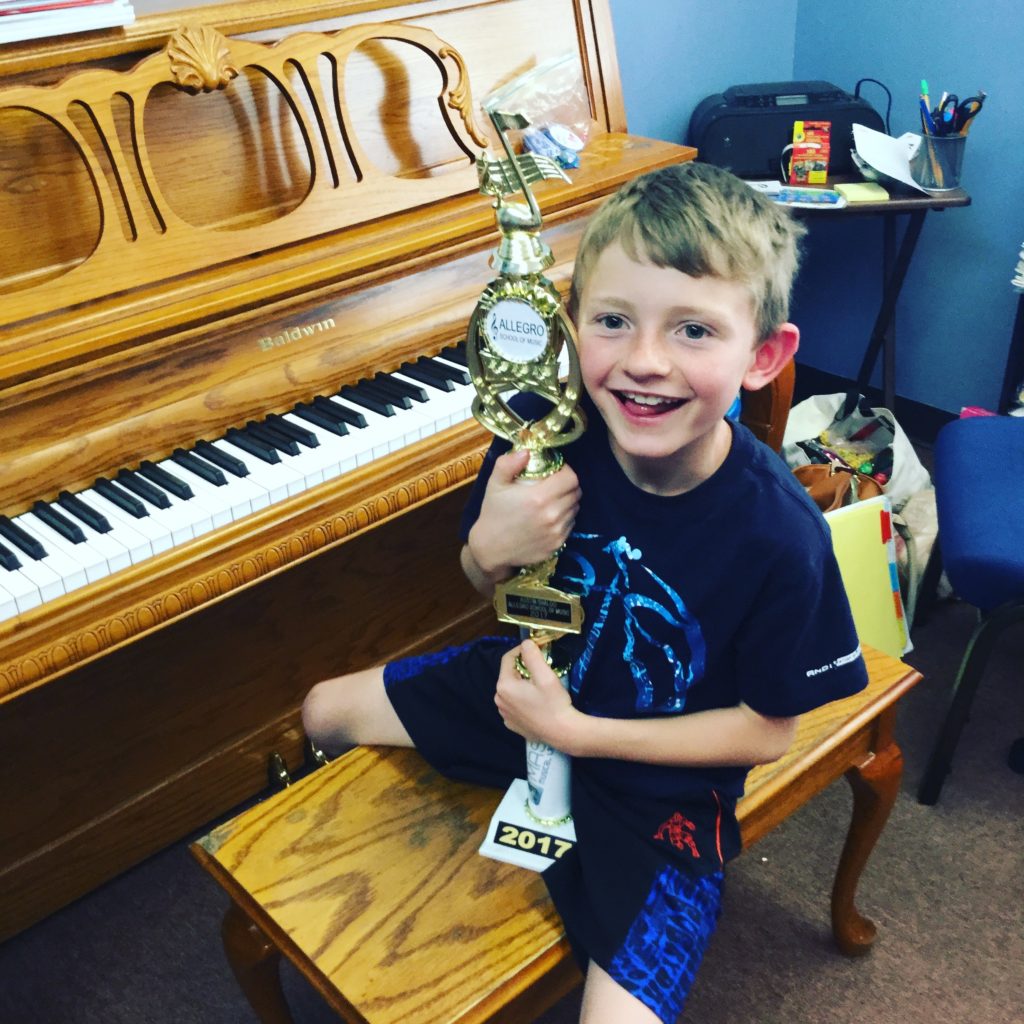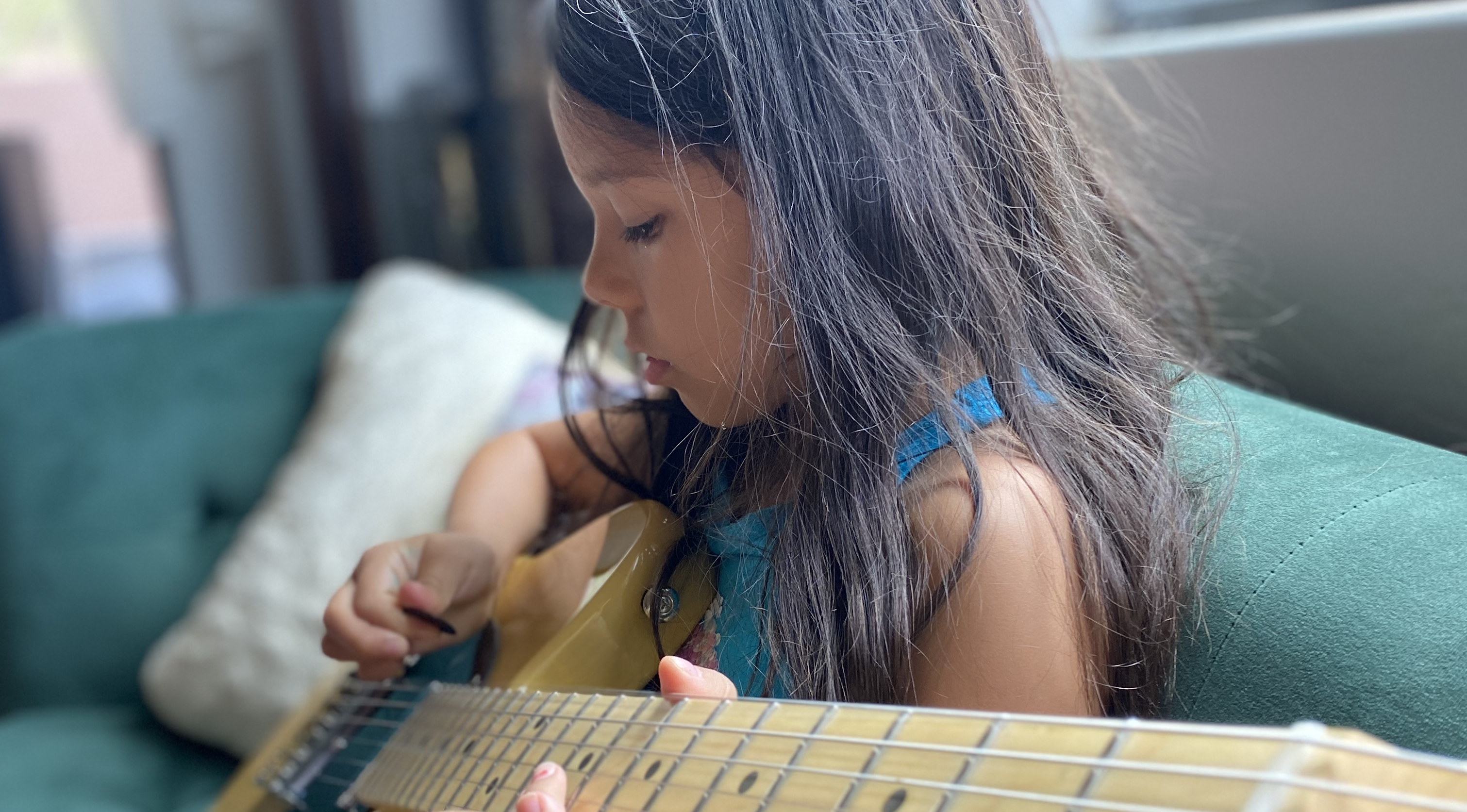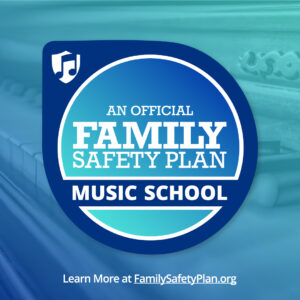Succeed in Music Lessons with our Practice Tips

Learning to Practice
Many of us know the saying: “How do you get to Carnegie Hall? Practice, Practice Practice.” Yes, it’s true, learning to play music requires practicing.
Or as I like to say: Learning to play music requires LEARNING to practice.
Because “practicing” does not come naturally to any of us.
It’s a skill that has to be learned. Therefore, we should not be surprised when we sign our kids up for lessons and realize that they don’t automatically know how to practice. Additionally, telling someone who doesn’t know how to practice, to “go practice” is also not going to work out very well.
General Practice Tips
- Work with your child to plan a practice routine on a weekly basis. This needs to be a mutually agreed upon schedule, not dictated by the parent. I suggest 3 days a week for a minimum of 15 minutes per day as a great starting point.
- Initiate and participate in the practice sessions. Think of yourself as positive reinforcement, not a critic. If you are attending the lessons, you should know enough to help out with basic note reading and counting for a beginning music student. If not, don’t worry about it, your positive encouragement speaks volumes.
- Set short term goals and rewards. Participating in the Musical Ladder is a great way to do this. However, it’s also helpful to create weekly or monthly practice goals. For example, I took both my kids out for pizza as a reward for practicing hard and participating in the Allegro Recital
Continue reading this article here

Thank you for the Google reviews!
Leave us a Google Review and we’ll give you a free lesson!
Harry Mason ★★★★★
My daughters first piano lesson was a huge success. Her teacher made her comfortable and listened to her desires to play. She learned some finger placements and was challenged to learn more for the next lesson. Wonderful experience.
Angela Paez ★★★★★
I would highly recommend Allegro School of Music. They are very professional and helpful! My daughter’s first guitar lesson went well. Her teacher Andrea is so patient and kind! to worry about any of it. My son has really been enjoying his lessons so I never have to remind him!
Graydon Lonigan ★★★★★
From my initial inquiry to each subsequent lesson, the service, expertise, and teaching has been fantastic. Aaron teaches in a clean and concise manner that is helping me reach my music playing goals. Front office help is just a text away and accommodating to my schedule.
Can music lessons help your kids excel academically?

Many parents believe that music and learning musical instruments can enhance children’s intelligence and academic performance. Some pregnant women even play Mozart for their unborn babies in hopes that classical music will give their children an academic edge. It turns out that learning a musical instrument indeed benefits the development of a child’s brain. Ample evidence suggests that taking music lessons at a young age can improve intelligence, cognitive and social development, and verbal communication skills.
Although it is commonly believed that learning classical music is the only way to reap these benefits, any genre of music will work as long as the child actively participates in music making.
Let’s go through some studies that have been done and methods you can employ to reap the benefits of music for your child’s development.
Studies on Music and Intelligence
In a 2004 study led by E. Glenn Schellenberg, PhD, 144 six-year-old children were given a standardized IQ test before entering the first grade, and they were given the same test again at age seven before entering the second grade. During the time between those two tests, they were randomly split into four groups. Two were control groups; one group was given no lessons, and the other group was given drama classes. The two experimental groups were given 36 weeks of vocal or keyboard music lessons. All four groups had reliable increases in IQ as a consequence of entering school; however, the two groups that received music lessons had a far greater increase in IQ, indicating that music lessons can improve intellectual ability over a short duration like 36 weeks.
Schellenberg then asked himself, “Would the effect get bigger with more than a year of lessons?”
In 2006, Schellenberg performed a follow-up study to find out if longer periods of music lessons would generate a higher increase in IQ. The follow-up study found a dose-response association whereby the longer a child takes music lessons, the higher the increase of IQ and academic performance. On average, every month of music lessons was accompanied by one-sixth of a point of increase in IQ. According to the study, the average increase of IQ would be 7.5 points over a period of six years. Besides studying children, the follow-up study also looked at college freshmen and found that taking music lessons as a child is a significant predictor of a higher IQ in young adulthood and a history of better grades in school.
Jamming instead of reading
It is widely known that reading to or with children benefits the developing brain. However, wouldn’t it be fun if the same benefits can be produced from playing music with your children? A 2015 study by the University of Queensland has shown that informal music education at home can produce the same benefits associated with shared book-reading, but at a higher rate of efficacy.
This conclusion was drawn from data analysis generated from studying more than 3,000 children. Parents of these children were asked to replace all shared-reading activities with music activities when the children were between two and three years old. The children were then given a range of tests that measured social, emotional, and cognitive improvements two years later. The results showed that music activities were particularly linked with prosocial skills, numeracy, and attentional regulation.
Music and Speech
It is often said that music is a form of communication that transcends languages, but it is now believed that music can help children learn spoken languages. In 2008, a study titled “Musical Training Influences Linguistic Abilities in 8-Year-Old Children: More Evidence for Brain Plasticity” was conducted to determine whether musical training can improve non-musical abilities such as reading and speech.
Read the rest of this article at:
Important Dates
March 8-14 Spring Break
May 31-June 1 Memorial Day
July 4th Independence Day
Welcome new students!
Ileana Marseille
Ethan Marseille
Kyleigh Anne Mason
Tristan Foreyt
Erica Figueroa
Erica Figueroa
Luis Leyva Bishop
Jeremy Padin
Jeremy Padin
Levi Finklestein
Taylor Clairmont
Jocelyn Morales
Zoey Gomez
Eric Lafontaine
Gabriel Dowdy
Vivian Demarco Powers
Elizabeth Littlewood
Mack Canady
Lisa Allen
Sadie Hatch
Joanna Sanderson
Breanna Hannon
Olivia Maison
Emily Stillwaugh
Siyana Zimmer
Jayda Marchant
Zoey Fuchs
Maya Andrysiak
Olivia Morales
Lauryn Shapouri
Aviani Valenzuela
Aviani Valenzuela
Jaxon Sullivan
Graydon Lonigan
Lana Stewart
Talia Raub
Allison Zaffarano
Sophia Calderon
Saul Holen
Isabella Herrera
Atticus Zapata
Taryn Williamson
Elianna Salazar
Audrielle Salazar
Diego Salazar
Nikolas Vladyka
William Jacobsen
Nese Calik
Ryan Curran
Emmalynn McClenon
Kayla Edmondson
Ronnie Keyes
Bentley Yelland
Scarlet Cazier
Cora Cunningham
Alexis Ladrigan
Abby Bobbitt
Maia Evans-Black
Janice Earle
Ricardo Blanco
Megan Kramer
Christian Michaelson
Karla Konkaew
Abel Ortiz
Mat Ferguson
Kelsey Roop
Zoe Gordon
Ethan Gordon
Luke Linaman
Jade Santiago
Joshua Linaman
Victoria Stabile
Brooke Maas
Gracie Barcelo
Daniel Saravia
Monica Martinez
Tea Yi
Maya Thaker
Isaiah Keto
Kristen Belt
Thanks for referring your friends
Refer a friend, get a free month!
★Allison Meadow
★Jeff McKee
★Jennie Jacob


